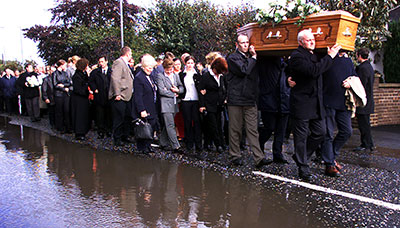More than 11 years have passed since investigative journalist Martin O’Hagan was murdered near his home in Lurgan, Northern Ireland, and the case has not been solved. Last week Northern Ireland’s public prosecutor announced a major setback to the case that has colleagues worried it never will be.
O’Hagan is one of three journalists murdered with impunity in the European Union, according to CPJ research, and the only case in the United Kingdom. The elusiveness of a conviction may signal that it is time for the government to examine what went wrong in the investigation, if it is to take a stand against impunity.
At a January 25 press conference, Northern Ireland’s director of public prosecutions, Barra McGrory stated that his office would not prosecute eight people investigated for the murder of O’Hagan. McGrory said the case relied too heavily on testimony of informant and confessed accomplice Neil Hyde. “In the absence of any corroboration, the available evidence is insufficient to provide a reasonable prospect of obtaining a conviction against any individual,” he said.
Hyde was jailed in February 2012 on offenses including drug dealing and arson. His 18-year sentence was reduced to three years for agreeing to help identify the culprits in O’Hagan’s murder and give evidence about the activities of the outlawed Loyalist Volunteer Force, a paramilitary group which claimed responsibility for the murder, according to local news reports.
A reporter for Sunday World newspaper known for his coverage of both Catholic and Protestant paramilitary groups, O’Hagan, 51, was walking home from a pub on September 28, 2001, when someone shot him dead from a passing car. Colleagues say they believe the LVF targeted O’Hagan for exposing narcotics network they controlled, as well as assassinations and intimidation rackets they orchestrated.
Following acquittals last year of 12 men accused of illegal activities in connection to another paramilitary loyalist group, the Ulster Volunteer Force, in a trial also based on uncorroborated testimony from an accomplice, the prosecutor’s decision in the O’Hagan case was not unexpected. The question is whether it signals the end of the pursuit of justice for O’Hagan.
“Most people–colleagues and family–are devastated. There is a fatalism in the statement of the [prosecutor] that is depressing,” said Seamus Dooley, Irish Secretary of the U.K. National Union of Journalists, which released a statement calling for a ” full investigation leading to the conviction of those responsible” for O’Hagan’s murder.
The lack of a conviction in the murder is all the more frustrating because the vehicle used in the attack was found near the crime scene and there are witness statements on record. The problem, says Richard Sullivan, deputy editor of the Sunday World, goes back to failures in the initial investigation which yielded little hard evidence. “Forensic evidence is minimal,” Sullivan said. “Police could have done much more. We know who killed Martin.”
Among those Hyde fingered for the crime are five men who the Sunday World has also reported over the years as the perpetrators: Drew King, his brother Robin King, Nigel Leckey, Mark Kennedy and Hyde himself. All were previously charged with offenses relating to the murder; all denied the charges against them; and the charges were eventually dropped against everyone except Hyde, news reports said. The prosecutor’s office originally said it would revive the case against the other four at the conclusion of Hyde’s case, the reports said.
“We are very disappointed, very upset that there appears to be no likelihood that those who killed Martin O’Hagan will be brought to justice, but not very surprised,” said Sullivan of reaction among the journalist’s colleagues.
The prosecutor’s service told CPJ that if fresh evidence comes up, they will reconsider a prosecution. The investigation is technically still open, but new forensic evidence is unlikely to come to light after more than a decade.
Still, NUJ’s Dooley urged authorities not to abandon the investigation just because 11 years have passed. “This is a serious murder and raises serious concerns,” Dooley told CPJ.
[Reporting from Wirral, United Kingdom]
